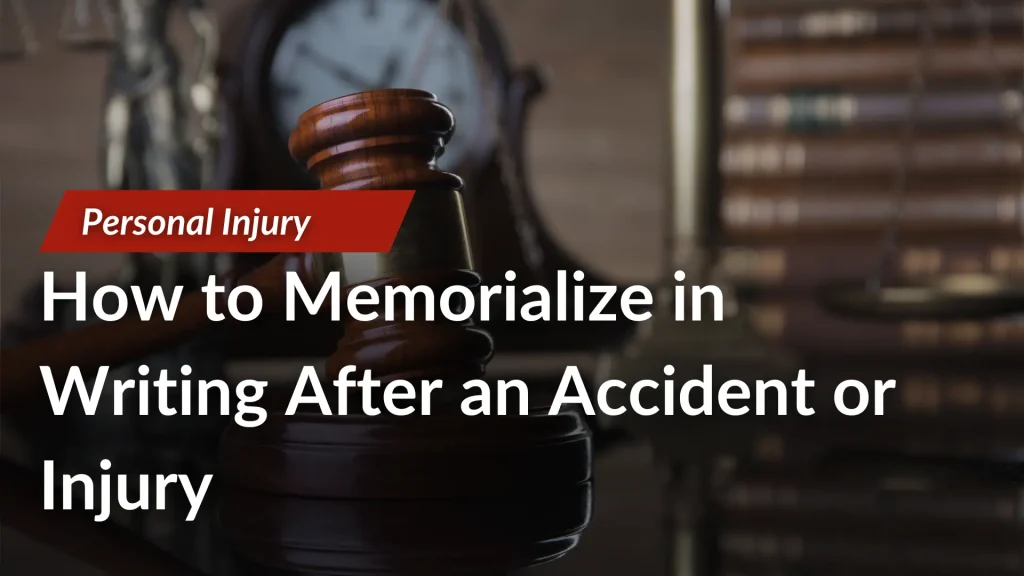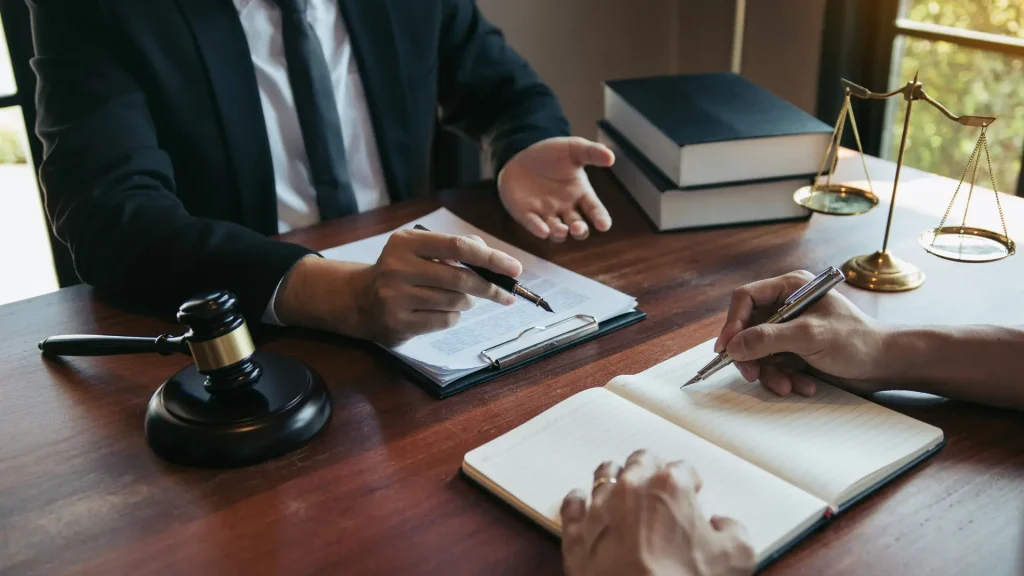
Memorializing information plays a significant role in insurance claims and personal injury lawsuits. Understanding how to memorialize the details of an accident in writing can help strengthen your case and increase your odds of a favorable outcome.
What Does “Memorialize” Mean?
To memorialize something means formally recording or documenting an occurrence or event, such as verbal statements or an accident scene, preserving it for future reference. Typically, the sooner you can memorialize details after an accident, the more accurate they will be.
For example, let’s say you slipped and fell in a grocery store. Information you may want to memorialize before you forget it or the store alters the accident scene includes:
- The aisle where the incident occurred
- The material or substance you slipped on
- The time at which the incident occurred
- Statements made by witnesses or store employees
- Details of the scene, including whether there was a wet floor sign
By memorializing this information, you’re preserving it for yourself and your attorney to reflect on later. If the store attempts to claim that there wasn’t a puddle or that they had a wet floor, signing out your memorialized information may refute their claims.
Ways to Memorialize Evidence After an Accident
Gathering and preserving evidence after an accident is crucial. Ways to memorialize the incident and its impact on your life include:
- Photographs – Photographs are one of the most effective ways to document an accident scene and the injuries you suffered due to the incident. Take clear, time-stamped photos of the scene, your injuries, property damage, hazards, and other relevant details. For example, take photos of the cars, road conditions, and relevant traffic signs after a car accident.
- Video Recordings – Videos are also effective for documenting accident scenes and injuries. Rather than taking multiple pictures, you can take a single video that documents the entire scene, any property damage, and your injuries. You can also record videos of how your injuries impact your life and your healing process.
- Audio Recordings – While less common, audio recordings can be useful for memorializing key details. You can record a verbal description of the accident scene, how you feel after the accident, and witness statements. When you contact an insurance company about a claim, there’s a good chance they will record your phone call as a form of memorialization.
- Journal Entries – Keeping a written journal is one of the best ways to memorialize your experience after an accident. Writing regularly about your pain levels, emotional state, and the impact of the injury on your daily life allows you to create a valuable record that you and your attorney can use in settlement negotiations or at trial. Journal entries are sometimes the only evidence supporting your claim for non-economic damages like pain and suffering.
What Should You Write Down After an Accident or Injury?
When memorializing an accident in writing, it’s essential to include specific information that may be relevant later in your insurance claim or legal case.
- Your Recollection of the Accident – As soon as possible after the accident, write down everything you remember, including the events leading up to the accident, the accident itself, and the aftermath. Every detail you can remember could be vital for your case, including the date, time, location, and even weather conditions if they contributed to the incident. If you know them, also write down the names of witnesses or people involved in the accident.
- Your Daily Pain Levels – Documenting your daily pain levels can demonstrate the longevity of your injury or the necessity of your treatments. For example, if you had severe pain until you began taking prescribed painkillers, it will be hard for the insurance company to deny that the painkillers are reasonable and necessary. Or, if your pain never gets better, it could be a sign that the pain may be chronic.
- How Your Injuries Impact Your Daily Life – Write down how your injuries affect your daily routine. For example, if you cannot work, drive, or perform routine tasks, you once could include that information in your journal. Over time, these entries will provide a clear picture of how the accident changed your life.
- How You Feel Emotionally – Injuries don’t only cause physical pain; they can cause emotional pain, as well. If you’re experiencing anxiety, stress, or depression due to the accident or your injuries, memorialize those feelings in your journal. You may be able to seek compensation for emotional distress.
- Your Recovery Progress – Keep a detailed record of your recovery journey, including any doctor’s visits, prescribed medications, received treatments, and physical therapy sessions. By recording your recovery process, you’re demonstrating the necessity of your treatments, making it hard for the insurance company to deny coverage for them.
Why Is It Important to Keep a Journal After an Injury?
 Keeping a journal after an injury is important for several reasons. First, it can help you recall details of the accident months later if your personal injury case goes to trial. Over time, your memories of the event may not be as accurate as they once were, which is why notes are vital.
Keeping a journal after an injury is important for several reasons. First, it can help you recall details of the accident months later if your personal injury case goes to trial. Over time, your memories of the event may not be as accurate as they once were, which is why notes are vital.
Thorough documentation in a journal can also support your case by demonstrating consistent evidence of your injuries’ impact on your life. This includes the physical and emotional pain you suffer and how your injury prevents you from doing certain activities.
The more information about the incident, your injuries, and your recovery that you memorialize in writing, the better.
Contact a Tampa, Florida, Personal Injury Attorney
If you suffered an injury caused by someone else’s negligence in Tampa, Florida, call Jurewitz Law Group Injury & Accident Lawyers at (619) 233-5020 or contact us online for a free consultation with an experienced Tampa personal injury attorney. We proudly service Tampa, Florida, San Diego, Mission Valley, and Carlsbad, CA. We’ll review your case, walk you through your legal options, and help you memorialize the evidence.
Related Posts:
How To Read a Police Accident Report in Florida
What Happens When You Reject an Insurance Settlement Offer?
Is It Worth Getting a Lawyer for a Minor Car Accident in Tampa?
Why Is My Car Accident Settlement Taking So Long?
Can You Get a Concussion From Whiplash After a Car Accident?


